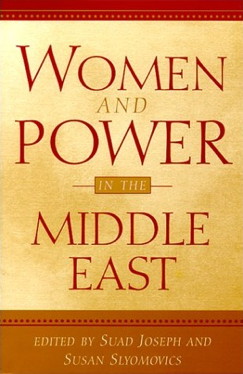
Women and Power in the Middle East
Suad Joseph / Susan Slyomovics
University of Pennsylvania Press (2000)
The seventeen essays in Women and Power in the Middle East analyze the social, political, economic, and cultural forces that shape gender systems in the Middle East and North Africa. Published at different times in Middle East Report, the journal of the Middle East Research and Information Project, the essays document empirically the similarities and differences in the gendering of relations of power in twelve countries—Morocco, Algeria, Tunisia, Egypt, Sudan, Palestine, Lebanon, Turkey, Kuwait, Saudi Arabia, Yemen, and Iran. Together they seek to build a framework for understanding broad patterns of gender in the Arab-Islamic world.
Challenging questions are addressed throughout. What roles have women played in politics in this region? When and why are women politically mobilized, and which women? Does the nature and impact of their mobilization differ if it is initiated by the state, nationalist movements, revolutionary parties, or spontaneous revolt? And what happens to women when those agents of mobilization win or lose? In investigating these and other issues, the essays take a look at the impact of rapid social change in the Arab-Islamic world. They also analyze Arab disillusionment with the radical nationalisms of the 1950s and 1960s and with leftist ideologies, as well as the rise of political Islamist movements. Indeed the essays present rich new approaches to assessing what political participation has meant for women in this region and how emerging national states there have dealt with organized efforts by women to influence the institutions that govern their lives.
Designed for courses in Middle East, women's, and cultural studies, Women and Power in the Middle East offers to both students and scholars an excellent introduction to the study of gender in the Arab-Islamic world.
